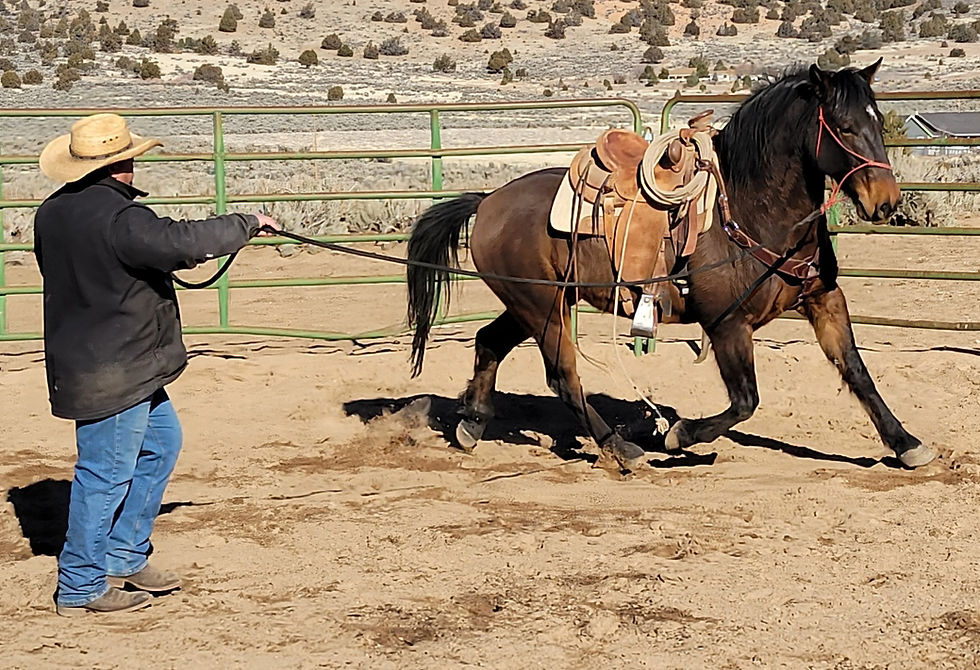Managing Pigeon Fever & Ranch Biosecurity
- Team Yriarte Horsemanship
- Oct 23, 2022
- 3 min read
As many of you know, we like many others in the Northern Nevada and Northern California region, have recently dealt with Pigeon Fever at our ranch. Since there are many rumors circulating about this disease, we would like to address the current status here, how we managed it, and how we are moving forward.
For a concise overview of Pigeon Fever, this is a very easy to read doc from a reputable source- https://equinediseasecc.org/Content/ContentDocs/Pigeon%20Fever%20factsheet_final.pdf
We discovered our initial affected horse (Patient 0) on October 10, 2022 with an abscess on his ventral midline. While examining and cleaning the area, the abscess spontaneously opened. The Patient 0’s owner was notified, and their vet came out the same day to evaluate, diagnose, and drain the remainder of the abscess material. After diagnosis with Pigeon Fever, all soil and materials contaminated with abscess material were sprayed with dilute (1:9 ratio) bleach, collected, and removed from the property. Patient 0 was moved to the furthest pen available with a minimum of 12 feet separating him from other horses on the property.
On the recommendation of veterinary internal medicine specialist, Dr. Hannah Leventhal, DVM MS, the following biosecurity procedures were implemented beginning October 10, 2022:
His previous stall has been disinfected with dilute bleach 3 separate times to date. This stall will be “rested” and not occupied for 4 weeks from October 10, 2022.
Patient 0 is fed and handled last, always with gloves.
His abscess was cleaned with gauze soaked in warm water to remove gross debris and abscess material once per day in the morning. Gloves changed after.
A hot pack, sealed in a Ziploc bag, was used along with gentle massage to encourage drainage of abscess material into a dry gauze sponge. A final cleaning with dry gauze was done. This was done for the first 3 days once per day in the mornings. Gloves changed after.
Swat was liberally applied around the wound daily after each cleaning. Gloves changed after.
Boots are disinfected with dilute bleach and clothing with Lysol immediately after leaving Patient 0’s stall. Clothes and boots are changed before handling any other horses or equipment. All gloves and gauze that had any contact with Patient 0 is treated as biohazard, sprayed with Lysol, sealed in a Ziploc bag, the bag sprayed with Lysol, then discarded in a sealed trash can.
One halter and lead were designated for Patient 0 and disinfected with Lysol after each use.
All horses are checked for evidence of fly bites or abscess development daily. Gloves are worn and changed between each horse and clothing/boots is disinfected with Lysol between each horse. Swat was applied to the ventral midline of each horse to deter flies.
As of October 20, 2022, Patient 0’s abscess has resolved, and the wound is granulating in beautifully and nearly healed completely. Thanks to these extensive measures, we have not had any of the 18 horses on our property other than Patient 0 develop Pigeon Fever. Out of an abundance of caution, we will continue to maintain strict biosecurity protocols and daily checks for the next 4 weeks per Dr. Leventhal’s recommendations. This is to ensure that no other horses may be harboring the bacteria. After November 20, 2022, we will again be fully open to visitors, lessons, and preparing for Obstacle playdays and other fun events!
Moving forward, we will be asking that all clients and visitors join us in disinfecting brushes, hoof picks, halters, and saddle pads with Lysol after every use to provide a healthier environment and the best possible care to all the horses at our ranch. We will also be deep cleaning these items monthly.

We want to thank all of our clients for their continued support and patience as we worked through this difficult situation! We are so grateful for your trust and allowing us to be a part of your journey.
If you have any questions for us at all, please feel free to contact us. We strive to be as transparent as possible, and we look forward to seeing you at future events!!









Comments